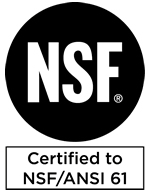
Choosing the Right Materials: Ensuring Certification and Performance in Water Treatment
When it comes to selecting a water treatment process, considering all the variables and requirements is crucial before deciding on the materials and construction methods. In the water industry, professionals must adhere to specific standards and regulations, and terms like "NSF certification," FDA Chapter 21, and NSF/ANSI 61 standards are commonly used and recognized.
Water purification presents numerous challenges, and one of the most critical aspects is choosing the appropriate materials for construction. It is essential to meet current certifications while also fulfilling customer expectations regarding performance and longevity.
In the realm of manufacturing Fiberglass Aerators, Decarbonators, Degasification towers, and tanks, there are various approved NSF liners, coatings, and resins available. However, it is not uncommon to see engineers specifying one over the other, leading to the question: why? The reasons can vary, ranging from familiarity with a particular type to recent presentations by vendors. Manufacturers who provide assistance in preparing specifications play a vital role in ensuring that engineering professionals stay up to date with the latest specifications and changes.
Certification Matters: NSF and FDA Compliance
NSF certification is a widely recognized and respected standard in the water treatment industry. It signifies that the equipment and materials used in the treatment process meet specific criteria for safety, performance, and reliability. The NSF/ANSI 61 standard, in particular, focuses on the health effects of materials that come into contact with drinking water. Compliance with this standard is crucial to ensure that the treated water remains safe for consumption.
Similarly, FDA Chapter 21 outlines the regulations and requirements for materials and substances that come in contact with food, drugs, and beverages. This chapter covers the evaluation of components used in water treatment systems to ensure they do not pose any health risks or contaminate the water.
Understanding the Certification Process
The certification process involves rigorous testing and evaluation of materials, components, and systems. This ensures that they meet the necessary quality and safety standards. Manufacturers must adhere to strict guidelines and regulations to attain and maintain NSF and FDA certifications.
When selecting materials for water treatment projects, it is essential to choose products that have undergone thorough testing and have obtained the necessary certifications. NSF-certified materials provide confidence that they have been evaluated by independent third-party organizations and have met the required criteria.
The Role of Manufacturers in Material Selection
Manufacturers like DeLoach Industries Inc. play a crucial role in guiding and assisting engineering professionals in the material selection process. Their expertise and up-to-date knowledge of the latest specifications and changes in the industry ensure that the materials chosen align with the necessary certifications.
By collaborating with manufacturers, engineers can make informed decisions based on performance, longevity, and compliance. Manufacturers provide valuable insights into the advantages and limitations of different materials, helping engineers select the most suitable option for their specific project requirements.
Performance and Longevity Considerations
Aside from certification, performance, and longevity are essential factors to consider when selecting materials for water treatment systems. The chosen materials must withstand the harsh conditions often encountered in these environments, including exposure to chemicals, fluctuations in temperature and pressure, and corrosive elements.
Fiberglass, a commonly used material in water treatment applications, offers exceptional corrosion resistance, high strength-to-weight ratio, and durability. Fiberglass Aerators, Decarbonators, Degasification towers, and tanks manufactured with high-quality fiberglass materials can provide long-term performance and reliability.
Collaborating with manufacturers who specialize in water treatment systems ensures that the selected materials meet the specific demands of the application. These manufacturers possess extensive knowledge of the industry's best practices and can recommend the most suitable materials for optimal system performance and longevity.
Contact DeLoach Industries Inc. for Expert Guidance
For more information or to receive expert guidance on material selection and compliance with certifications, reach out to the professionals at DeLoach Industries Inc. With decades of experience serving the municipal, industrial, and food and beverage industries, DeLoach Industries specializes in the design, manufacturing, and operation of water treatment, wastewater treatment, odor control, and pisciculture/aqua farming systems.
DeLoach Industries Inc. stands apart from traditional fabrication shops by providing comprehensive services tailored to each customer's unique needs. Their in-house engineering and CAD design support, manufacturing capabilities, and field services, including annual service contracts, ensure that clients receive the highest level of support throughout their projects.
Contact DeLoach Industries Inc. at (941) 371-4995 to learn more about their expertise, services, and how they can assist you in achieving optimal performance and compliance in your water treatment systems.




